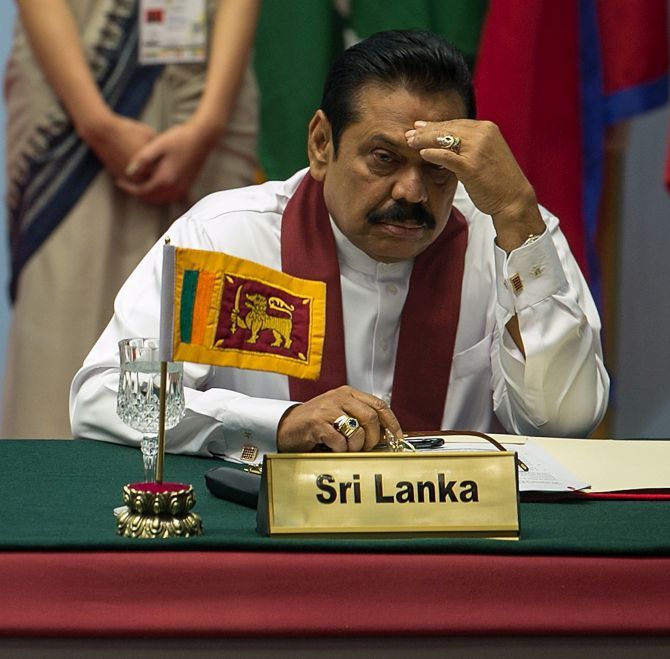Unlike in the presidential polls, victory might not have been complete, at least as yet, for Mahinda Rajapaksa’s electoral rivals. While his one-time aide and confidant, Maithripala Sirisena, became president without any issues after defeating him, incumbent Prime Minister Ranil Wickremesinghe, who again may not command an absolute majority in the 225-member parliament, would have to count on his ‘national government’ concept to carry the day and the nation with him, this time round, says N Sathiya Moorthy.

It’s not always that a trailing leader in South Asia or the rest of the Third World in general concedes an election even before even a fraction of the final results is known. Yet, Sri Lanka’s former president and present prime ministerial aspirant, Percy Mahinda Rajapaksa, has done so twice in eight months.
First, Rajapaksa conceded the presidential polls when only the results from the Tamil and Muslim areas, and early trends from the southern ‘Sinhala heartland’, were known in the early hours of January 9, only a day after polling.
On the morning of August 18, he was reported to have conceded the parliamentary polls, again after the early trends became known a day after the nation’s 65 per cent of the nation’s 15 million voters had cast their lot.
Yet, unlike in the presidential polls, the victory might not have been complete, at least as yet, for Rajapaksa’s electoral rivals. While one-time Rajapaksa aide and confidant, Maithripala Sirisena became president without any issues after defeating him, incumbent Prime Minister Ranil Wickremesinghe, who again may not command an absolute majority in the 225-member parliament, would have to count on his ‘national government’ concept to carry the day and the nation with him, this time round.
That’s because the Rajapaksa camp is yet to concede the leadership of the Sri Lanka Freedom Party and the party-led United People’s Freedom Alliance to President Sirisena.
More than once during campaign time, Sirisena had publicly declared his unwillingness and/or unpreparedness to invite Rajapaksa to form a government even if their UPFA came out on the top, with or without an absolute majority.
As party chief, Sirisena also replaced a majority of Rajapaksa loyalists in the SLFP central committee with men of his choice, if only to carry forward his vow, post-poll.
Rajapaksa had urged Sirisena to follow his own January example and respect the people’s mandate. That was on the eve of polling. The situation has changed since.
However, the Sirisena nominations to the SLFP come with their own set of problems for Rajapaksa. Unless he is ready to retire from politics, Rajapaksa would be under pressure from his loyalists to ensure that Sirisena does not attempt to change the SLFP-UPFA ‘national list’ nominees to parliament with one of his own, to be handled by his own chosen ones for the party/alliance general secretaries.
Despite demands and promises to change the scheme, Sri Lanka’s parliamentary polls now involve a combination of ‘proportional representation’ and ‘preferential votes’. Voters in each of the 22 ‘electoral districts’ first choose a party and then their preferences for X number of seats in the district from a list of X+3 nominees fielded by individual parties and independent groups.
The seats in each district are distributed in proportion to the vote-share of parties, and those ‘preferred’ by the voter from the list of the party of their choice, gets elected in the order of individual votes polled.
There is also a national list of 29 seats in a total of 225. They are picked in the ranking order, from a list that individual parties submit to the election commission, based on the poll percentage at the national level.
It’s here that the Rajapaksa camp can contest the post-poll claims of the Sirisena group. Yet, for the former to stall the process, they would have to appeal against a lower court order on Sirisena’s party appointments, that too on the very eve of polls.
The higher courts are in recess till August 31, and there is anticipation/expectation that the government-making process might have been over by then. That could leave a sour Rajapaksa sulking, but the new government could be expected to keep him busier on the legal front, particularly in terms of corruption charges dating back to his presidency.
Yet, Rajapaksa’s problems might not necessarily involve ‘war-time, accountability issues’, in which the nation’s Tamils and the ‘international community’ (read: the West) would be interested even more when the UNHRC session opens in Geneva in mid-September.
PM Wickremesinghe is already on record, and more than once, that they would not agree to anything but an ‘internal probe’ but of a kind more acceptable to the international community than one under the Rajapaksa regime in its time.
In the context of the UNHRC session, yet independent of the poll results, the coming weeks and months could witness a revived national discourse on power-devolution on the one hand and the ‘executive presidency’ on the other.
In its manifesto and otherwise, too, the Rajapaksa camp had climbed down on 13-plus power devolution, as promised when he was president, to seemingly settle for India-facilitated thirteenth amendment to the constitution, but with no clear commitment on ‘land’ and ‘police’ powers that the Tamils (alone) have been seeking all along.
PM Wickremesinghe’s UNP promised full power devolution, again leaving the details vague. However, when the Tamil National Alliance reiterated its age-old demand for ‘federalism’ in its manifesto, Ranil said, ‘No’, but talked power devolution down to the ‘village level’ -- whether or not of the type that had existed in the pre-war era.
The Tamils themselves are divided between ‘federalism’ and ‘confederation’, with a smaller group hoping for either of them to lead them to a ‘separate State’.
There are still others, including some Sri Lankan Tamil Diaspora groups, who hope for separation without having to go through such processes which, to them, could head either way. Neither of these groups would mind the TNA settling for ‘federalism’ of some substantive kind, if that could be the starting point for their ‘separatist’ aspirations and endeavours.
On the other issue of executive presidency, if he became the nation’s first head of state to ride two horses at one go almost since becoming the common Opposition candidate ahead of last January’s presidential polls, incumbent Sirisena has continued to send out confusing political signals all round, since.
Even while praising Sirisena sky high for heralding the ‘national government’ for ‘good governance’ and promising one even after the parliamentary polls -- owing mainly to foreseeable problem of numbers – Wickremesinghe and his United National Party had talked about a new constitution within two years.
The aim, now as before the presidential polls, was to dilute, if not abolish, the ‘executive presidency’, which many in the country see as the fountainhead of all political problems, economic worries and fiscal corruption in the country.
It has captured the voter imagination, too, so much that any post-poll government with a strong prime minister would only be happy to dilute the executive presidency as much as possible.
A politically weak president like Sirisena might not have the strength, political courage, or even the wish -- as has been evident since January -- to challenge or fight back.
On the parliamentary poll front, he had started off with denying party nomination for Rajapaksa, but settled for him but only after reiterating that the latter would not be their SLFP-UPFA’s prime ministerial nominee, either before or after the polls.
Yet, on details, there could be differences between the president and the prime minister -- owing mainly to personality issues and consideration -- and between the government and the ‘Opposition’, which continues to remain as vague as before the parliamentary poll.
The TNA and the Muslim community in particular would demand iron-clad guarantees in terms of promises to the ‘ethnic minorities’ and even more to convince them that the ‘majority Sinhala community’ and the Sri Lankan State, both, meant business this time round at the very least.
Monday’s polls are noted for other specifics, too. The Sri Lankan Tamils in the North and the East have given the Tamil National Alliance a clear mandate once again in terms of seats.
But they did not show the same enthusiasm as evident in the war-delayed, maiden Northern Provincial Council of November 2013, or while casting the decisive anti-Rajapaksa vote in the January presidential election this year.
It would be tempting for the TNA leadership to conclude/claim that the Tamil voter mood was dictated by their lack of involvement in a Colombo government. It’s a greater, if not harsher, message for the TNA to set its house in order.
At least twice during the campaign-period, TNA’s Northern Province chief minister, former Supreme Court justice, C V Wigneswaran, refusing to seek votes for the party but asked the Tamil s to vote for ‘principled candidates’.
It was believed to be a campaign in favour of the Tamil National People’s Front of Gajendra Kumar Ponnambalam, who would not settle for anything less than a ‘confederation’ within a ‘united Sri Lanka’.
On the Sinhala side, the left-nationalist JVP’s hopes of a future re-bound could not be ignored, though they may look as good as lost just now. Pre-poll, the party repeatedly claimed that it would come to power in the next elections. It looks a far cry just now, but it definitely has regained the electoral ground that it had gained – and lost -- over the past decade and more.
The JVP voting figures might have proved pollsters wrong. While not anywhere near pre-poll predictions of the party winning 13-17 seats, the JVP also seemed to have cut not into the left-leaning SLFP-UPFA votes, but that of the centre-right UNP in the one-time southern Sinhala stronghold.
But in the upcountry areas, the Indian Tamils, and in the East, the Muslims seemed to have re-affirmed their traditional faith in the UNP poll-ally, under whose ‘Elephant’ symbol alone they contested this time, again.
That has meant the loss of electoral space for the Ceylon Workers Congress of former minister Arumugan Thondaman and also some anti-Rajapaksa leaders from within the SLFP-UPFA, whom rival Sirisena had counted upon.
With the Muslims on its side and the eastern Trincomalee district voting in their favour, too, the UNP-UNFGG could now tell the TNA once again that they could not have the re-merger of the North and the East, which the party had demanded.
Earlier, the Sri Lankan supreme court had rendered the merger under the India-Sri Lanka Accord of 1987 infructuous -- which the then Rajapaksa regime implemented in letter and spirit -- then and there.
N Sathiya Moorthy, veteran journalist and political analyst, is director, Observer Research Foundation, Chennai Chapter.











 © 2025
© 2025